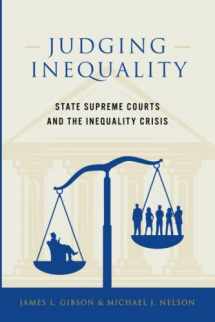
Judging Inequality: State Supreme Courts and the Inequality Crisis
Book details
Summary
Description
Product Description
Social scientists have convincingly documented soaring levels of political, legal, economic, and social inequality in the United States. Missing from this picture of rampant inequality, however, is any attention to the significant role of state law and courts in establishing policies that either ameliorate or exacerbate inequality. In
Judging Inequality, political scientists James L. Gibson and Michael J. Nelson demonstrate the influential role of the fifty state supreme courts in shaping the widespread inequalities that define America today, focusing on court-made public policy on issues ranging from educational equity and adequacy to LGBT rights to access to justice to worker’s rights.
Drawing on an analysis of an original database of nearly 6,000 decisions made by over 900 judges on 50 state supreme courts over a quarter century,
Judging Inequality documents two ways that state high courts have crafted policies relevant to inequality: through substantive policy decisions that fail to advance equality and by rulings favoring more privileged litigants (typically known as “upperdogs”). The authors discover that whether court-sanctioned policies lead to greater or lesser inequality depends on the ideologies of the justices serving on these high benches, the policy preferences of their constituents (the people of their state), and the institutional structures that determine who becomes a judge as well as who decides whether those individuals remain in office.
Gibson and Nelson decisively reject the conventional theory that state supreme courts tend to protect underdog litigants from the wrath of majorities. Instead, the authors demonstrate that the ideological compositions of state supreme courts most often mirror the dominant political coalition in their state at a given point in time. As a result, state supreme courts are unlikely to stand as an independent force against the rise of inequality in the United States, instead making decisions compatible with the preferences of political elites already in power. At least at the state high court level, the myth of judicial independence truly is a myth.
Judging Inequality offers a comprehensive examination of the powerful role that state supreme courts play in shaping public policies pertinent to inequality. This volume is a landmark contribution to scholarly work on the intersection of American jurisprudence and inequality, one that essentially rewrites the “conventional wisdom” on the role of courts in America’s democracy.
Review
“
Judging Inequality is an extraordinary achievement. In this empirical tour de force of exceptional transparency using massive new data sets, Gibson and Nelson have produced a seminal and indispensable work on state supreme courts replete with nuanced, compelling, and sometimes surprising results. Bravo!”
—
Melinda Gann Hall, Professor of Political Science, MSU Distinguished Faculty Award Winner, and College of Law Faculty Affiliate, Michigan State University
“For too long, political scientists have paid little attention to the state courts relative to their importance in U.S. politics and policy. This pathbreaking book and data by James Gibson and Michael Nelson should ignite such attention. In
Judging Inequality, the authors analyze six thousand cases to present compelling evidence on how judicial institutions and judges’ backgrounds shape inequality in the United States today.”
—
Brandice Canes-Wrone, Donald E. Stokes Professor of Public and International Affairs and Professor of Politics, Princeton University
“A pathbreaking, first-of-its-kind study of how U.S. state law and courts—purportedly closer to the people themselves than the U.S. Supreme Court—effectively shield powerful economic interests from popular calls for equality and redistribution,
Judging Inequality is an exemplary work of social science. James L. Gibson and Michael J. Nelson’s masterful yet sobering account is a must-re


We would LOVE it if you could help us and other readers by reviewing the book
Book review



